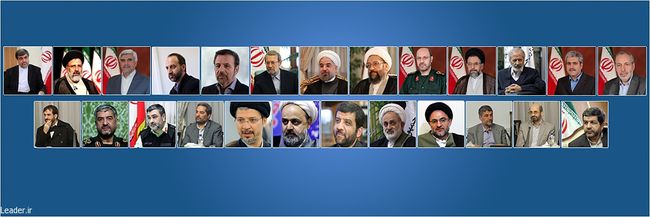Ayatollah Seyyed Ali Khamenei, the Leader of the Islamic Revolution, has appointed new members of the Supreme Council of Cyberspace for another four-year term.
In his decree, Ayatollah Khamenei underscored the significance of the Supreme Council of Cyberspace in its mission to “vigilantly and forcefully face up to the developments in this sphere” and also the main task assigned to this institution with regards to “policymaking, macro-management, necessary and timely planning and decision-making as well as effective and up-to-date supervision and monitoring in the cyberspace”. Ayatollah Khamenei signed off on the 10-point mission and tasks assigned to the Supreme Council of Cyberspace.
The full text of the decree of the Leader of the Islamic Revolution is as follows:
In the Name of Allah, the Compassionate, the Merciful
The emergence of cyberspace in recent decades has been one of the largest symbols of global development – a stunning event whose effects on cultural, social, economic, political, security and defense sectors come further to the fore at national and international levels.
Now, more than three years have passed since the formation of the Supreme Council of Cyberspace. This council, along with its affiliated National Cyberspace Center, is recognized as the focal point for vigilantly and forcefully facing up to the rapidly growing developments of this sphere, for using opportunities and potentialities and dealing with its traumas and threats.
The main task assigned to this council is policymaking, macro-management, drawing up plans and making the necessary decisions as well as effective and up-to-date supervision and monitoring in this sector. Therefore, it is necessary for this institution to prepare itself for fulfilling a heavy responsibility over a four-year period in the light of the fast and complicated developments in this sector on the one hand and the country’s real and accumulated needs on the other.
While reiterating the provisions of the first decree on the establishment of the Council and its addendum, I deem it necessary for the esteemed president and the members of the Supreme Council of Cyberspace to seriously take into account the following points:
1. Dissolution of the previously endorsed supreme councils which function in parallel with this Council for consolidating the position of the Supreme Council beyond the [three] branches [of the government] and its focal and position-oriented status, and transferring the tasks of those councils to the Supreme Council of Cyberspace.
2. Stabilizing and consolidating the position of the National Center of Cyberspace as the arm of the Supreme Council of Cyberspace with the objective of realizing the decisions of the Council with the following tasks: Monitoring the current circumstances in cyberspace and forecasting developments in his sphere at national and international levels, coordination and synergy among different relevant ministries, organizations and institutions in scientific, technical, economic, commercial, legal, disciplinary, security and defense sectors related to cyberspace and continued supervision regarding the performance of relevant institutions and sectors within the framework of the resolutions of the Supreme Council.
3. Upgrading the Islamic Republic of Iran to a cyberpower at the level of influential global powers and enjoying the power of initiative and interaction with other countries in defining rules and regulations related to cyberspace on the global scale with an ethical and just approach.
4. National and overall endeavors and serious investment in the invention and development of all types of technology and advanced and competitive industries by using and launching modern university disciplines and training committed, specialized and efficient human resources in software and hardware, content and service sectors throughout all domains of cyberspace particularly in the 6th Development Plan and the country’s annual planning.
5. Accelerating the launch of the national information network after its approval by the Supreme Council and continued and effective supervision by the National Center on the stages of launch and its operation.
6. Paying special attention to cleaning and securing the country’s cyberspace as well as protecting the privacy of people and effective confrontation with infiltration into and infringement of this sphere by foreigners.
7. Promoting Islamic and Iranian norms, values and lifestyle and averting breaches as well as cultural and social traumas in this sector and effective confrontation with all-out cultural onslaughts and promoting the culture of being an Internet user and boosting the knowledge of society on cyberspace.
8. Securing an appropriate position and share for the knowledge-based economy in cyberspace within the framework of the policies of the Economy of Resistance and all-out planning for improving the business climate related to cyber technologies and benefiting from the opportunities of job creation and improvement of content, services and trade in this sector.
9. Development of content and effective and competitive services in compliance with Islamic-Iranian values and culture in all segments of society and encouraging people’s participation and using the potential of the private sector in this field.
10. Drawing up and approving security, legal, judicial and disciplinary regulations required for the cyberspace.
The legal and natural persons appointed to the Supreme Council of Cyberspace for the new term are as follows:
Legal persons are: The president (chairman of the Supreme Council), speaker of the Islamic Consultative Assembly (Majlis), head of the judiciary, head of the Islamic Republic of Iran’s Broadcasting Organization, secretary of the Supreme Council and the head of the Center, state chief prosecutor, minister of communications and information technology, minister of culture and Islamic guidance, minister of science, research and technology, minister of intelligence, minister of education, minister of defense and logistics for Armed Forces, vice-president for scientific and technological affairs, head of the Cultural Committee of the Islamic Consultative Assembly, head of the Islamic Development Organization, commander of the Islamic Revolution Guards Corps, chief of police.
Natural persons are: Hojatoleslams and Drs. Seyyed Saeed Reza Ameli, Dr. Hamid Shahryari, Dr. Reza Taqipour, Dr. Mehdi Akhavan Behabadi, Mr. Masoud Abou-Talebi, Dr. Kamyar Saqafi, Dr. Rasoul Jalili and Mr Ezzatollah Zarghami
I pray to Almighty God to bestow the chance of offering services upon all these gentlemen.
Seyyed Ali Khamenei

